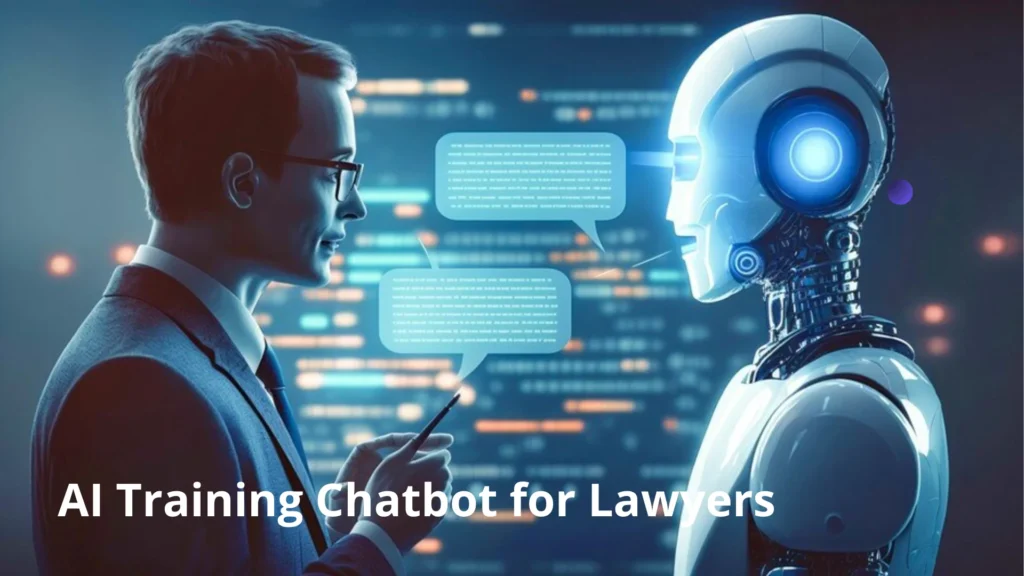Are you Struggling to Manage Important Legal Operations? You’re not alone.
Other People Are Dealing With the Same Challenges.
A lot of lawyers are overwhelmed by having to answer the same questions, draft contracts, and look up legal information too often. It’s exhausting.
Most of your work on various papers and calls remains unrelated to the progress of the case. The number of deadlines keeps growing. Clients wait. No matter how hard you try, you never feel like you’re on track.
There is an easier way. In just a few years, lawyers are being assisted by AI training chatbots that enable them to finish twice as much work as usual, look up evidence faster, and give quick, truthful advice to clients.
What is a Legal AI Training Chatbot?
A legal AI training chatbot is made to assist lawyers and other members of a legal team. Unlike other chatbots, it is built using legal data and knowledge.
Imagine a junior associate who keeps working nonstop, never feels tired, and always has the best answers on hand. You can ask questions, share contracts, or use the legal aid to research information, and it delivers the required details almost instantly.
If you’re reading a contract, preparing for a hearing, or taking on new clients, a legal AI chatbot can help you finish faster and maintain good work quality.
Benefits of Using an AI Training Chatbot in the Legal Industry
Increased Productivity
Repetitive responsibilities such as processing clients’ information, making documents, and answering FAQs are handled by AI chatbots. Because of this, lawyers can work on important decisions and handle cases without becoming overworked.
Faster, Smarter Legal Research
Lawyers can now avoid sifting through databases and instead pose their legal questions or upload papers to the chatbot. It delivers relevant cases, overviews, or additional information, saving you valuable hours of paperwork.
Better Access to Legal Information
Less-established lawyers now have immediate access to legal information, without paying for a big subscription or maintaining a larger staff.
Improved Client Experience
With chatbots, your team replies immediately to clients, gives them step-by-step updates, and offers well-defined actions for everyone.
Compliance & Accuracy
Taught with legal information, AI chatbots follow the rules and will not provide advice that is too risky. They assist in following industry guidelines as they increase how work is done.
Suggested Read: https://heyeve.ai/blogs/heyeve-ai-chatbot-assistant/
Top 10 AI Training Chatbots for Lawyers in 2025
With the law industry advancing at a rapid pace, using AI chatbots is one way the smartest firms are keeping ahead of their competitors. Not only do these products assist in researching the law, reading files, preparing contracts, supporting clients, and training, but they also help save time and money.
Heyeve AI
Heyeve AI is a legal AI chatbot that helps users practice for different courtroom situations. The application is intended for trial lawyers, legal teachers, and students who can use it for mock cross-examinations, practice depositions, and let the AI object to what they say.
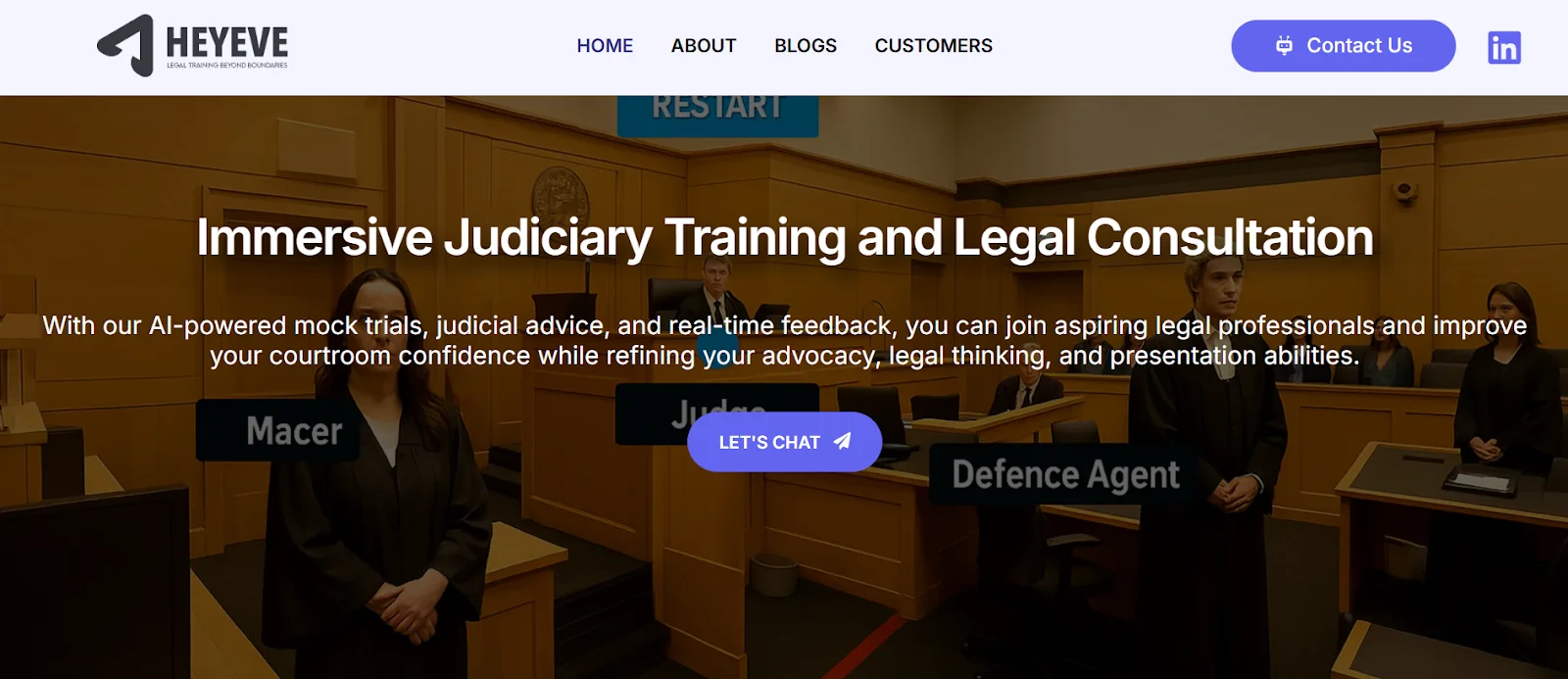
Heyeve focuses on teaching people key aspects of persuasive speaking. You have the option to try courtroom debates, and the AI will give instant advice. It’s the same as getting trial coaching at any time of the day or night.
Application: Law firms rely on it to introduce new lawyers to their practice, sharpen their deposition abilities, and practice giving important oral arguments.
Harvey AI
Harvey is an AI chatbot equipped with GPT technology and designed using extensive legal information. It aids in creating, reviewing, and editing the structure of legal documents, so it’s an ideal choice for big law companies and departments.

Harvey is used by big firms like Allen & Overy, thanks to its skills in handling complicated legal cases. Harvey is set up to help teams perform comprehensive and detailed legal research and tasks.
Scenario: Assisting with litigation, researching laws in various places, and examining contracts written in multiple languages.
Spellbook
Spellbook is an AI tool that operates and does its work within Microsoft Word. The use of legal GPT allows professionals to make contracts, edit them, and review them quickly.

As an AI chatbot trained for legal documents, Spellbook provides useful clauses according to context, points out problems with potentially suspicious terms, and remembers which parts you modified in the past. It changes the slow process of reading contracts into a step-by-step semi-automated approach.
Benefit: Helps in-house legal teams, lawyers, and businesses generate contracts quickly and reliably from within Word.
ChatGPT
If you provide ChatGPT with your law firm’s corporate content or team it up with tools or plugins, it becomes a personalized AI training chatbot for law firms.
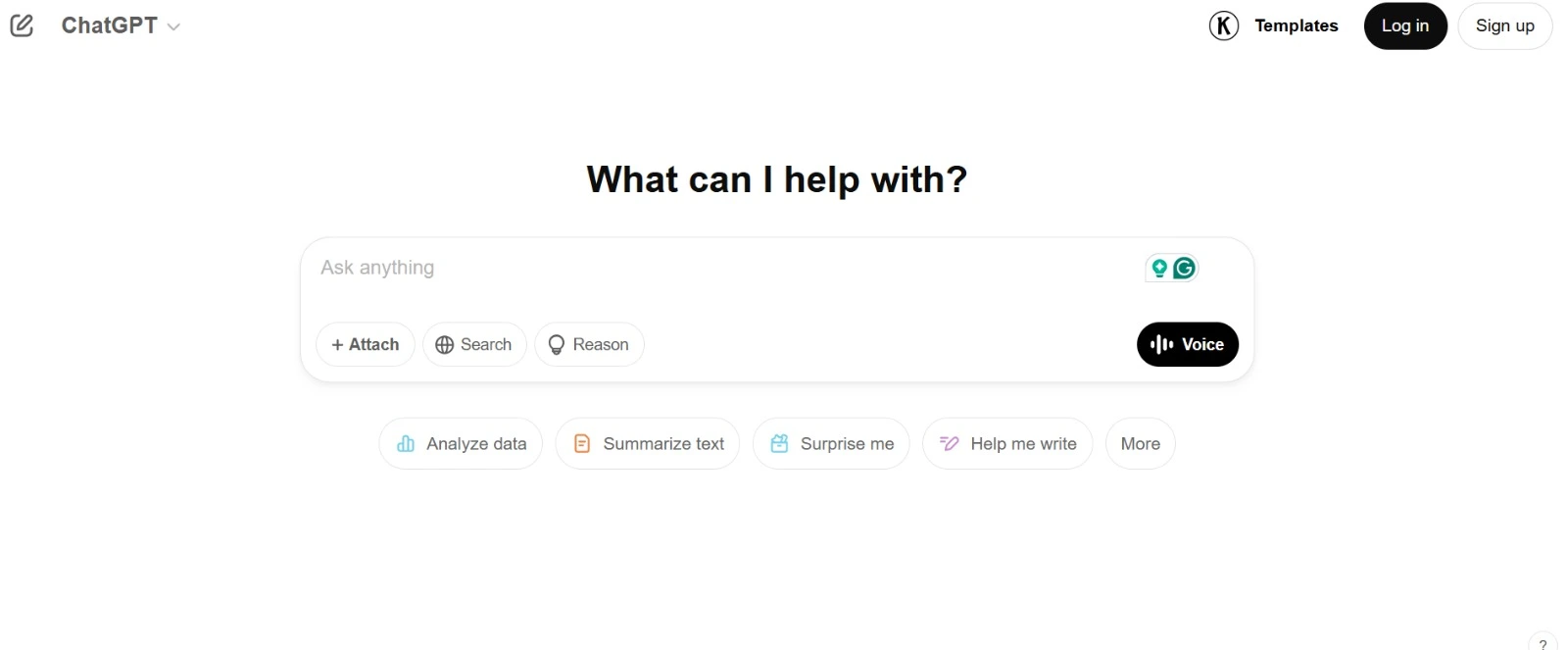
Depending on how you configure it, the software can assist with legal research, form entry, and returning briefs. Since privacy layers and data integration are available, many firms are now developing secure chatbots using ChatGPT.
Use Case: Create solutions inside the law firm, support junior lawyers, offer client chats, or develop tools for document generation.
Juro
The platform Juro is designed for contract management, and it uses AI technology to power its chatbot. Collaboration between teams is simple because contracts can be created, edited, and managed all in the same place using AI.
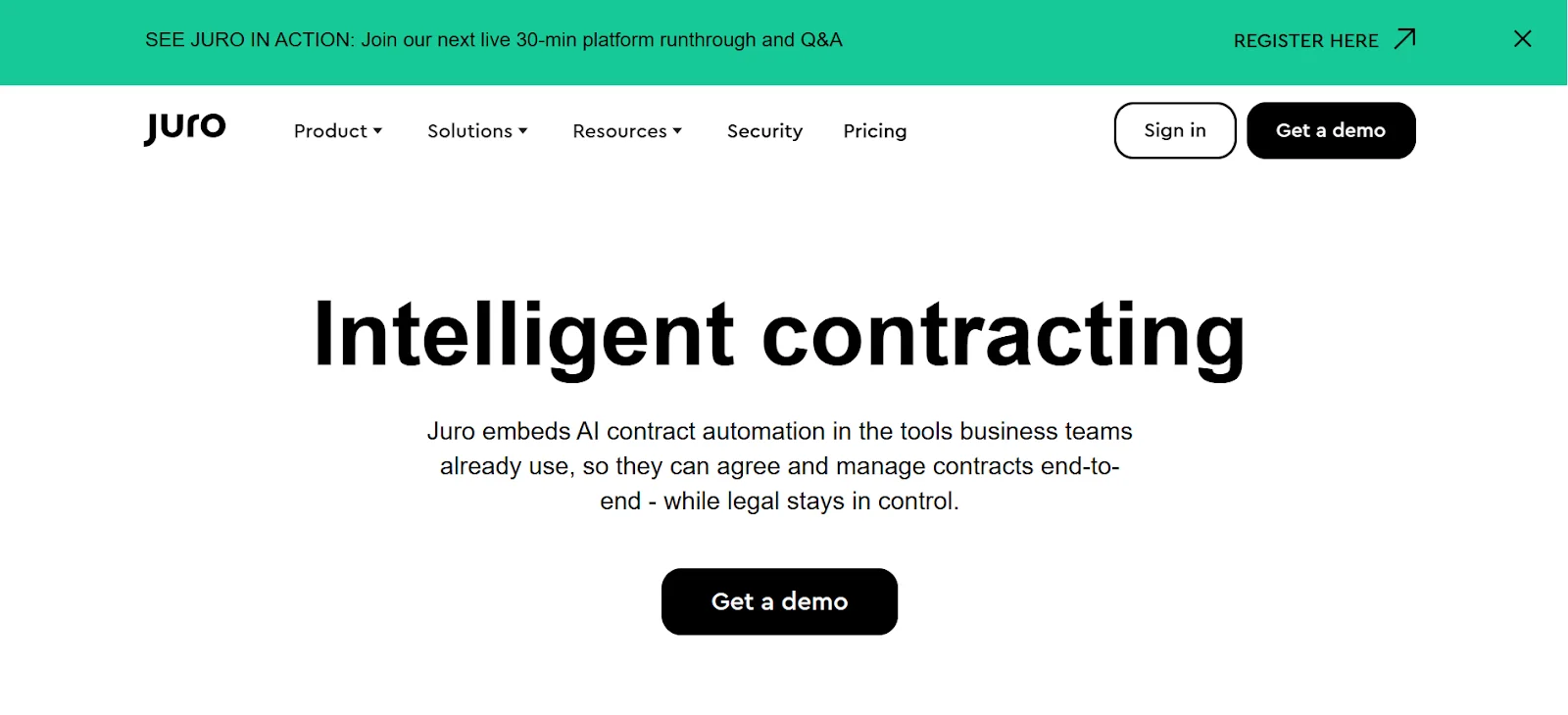
It makes it easier for legal and non-legal teams to become partners in the process. The chatbot guides you at every step of processing a contract.
Use Case: For startups experiencing fast growth and companies where the legal team receives high volumes of contracts.
LawDroid
LawDroid provides an easy-to-use chatbot builder that is designed for use by lawyers. Missing calls, waiting for clients, and preparing documents are issues its most common in small law offices.
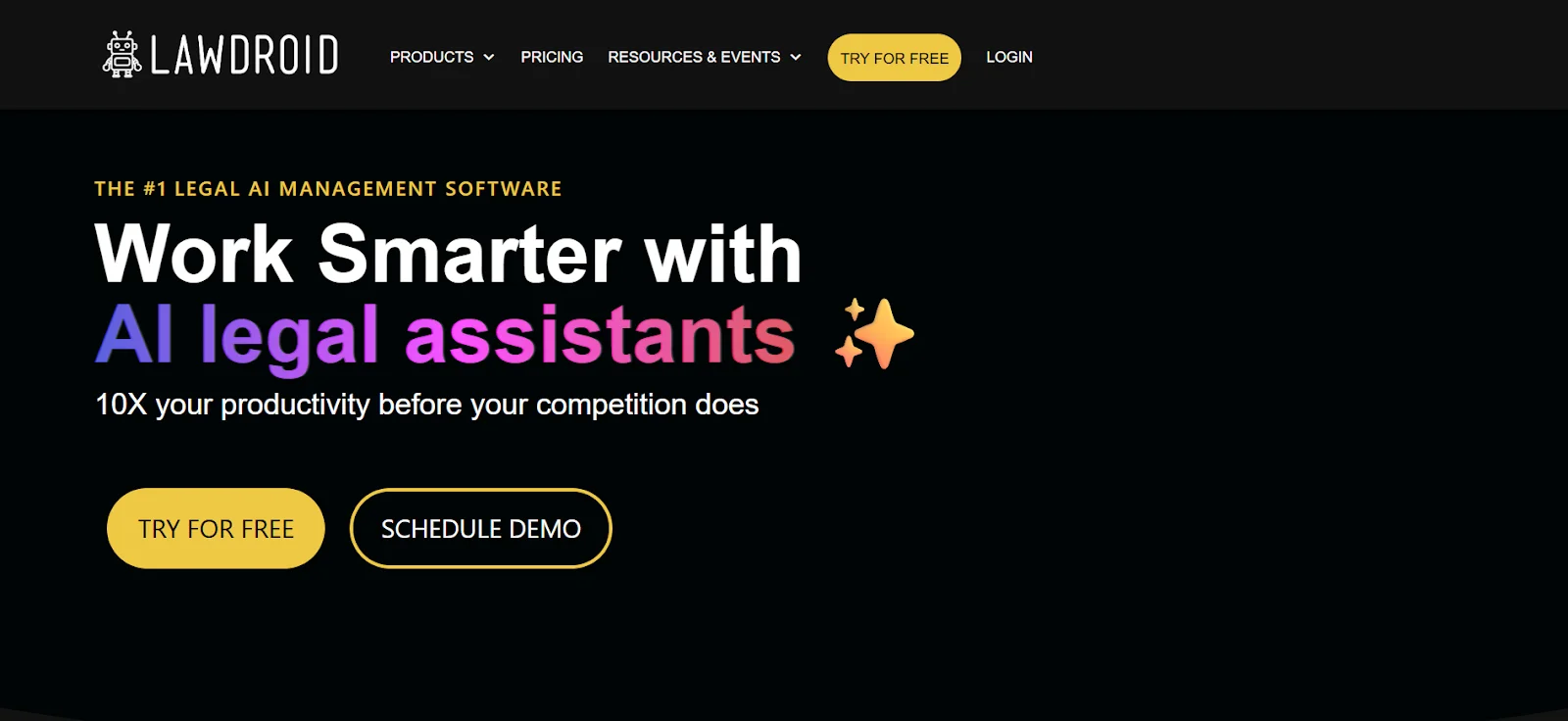
LawDroid’s builder allows you to create your own AI chatbot without any programming experience. It can also be used with Clio and MyCase.
Application: You can automate the first consultations, select and follow up with potential buyers, and create typical documents without doing anything manually.
Read Also: https://heyeve.ai/blogs/ai-voice-assistants-in-legal-education/
CaseMine
CaseMine uses traditional research approaches, as well as machine learning and contextual mapping. It works similarly to an AI bot, finding relevant cases and showing which ones are connected by describing parent and supporting cases, and describing laws and reasons for the decisions of judges.
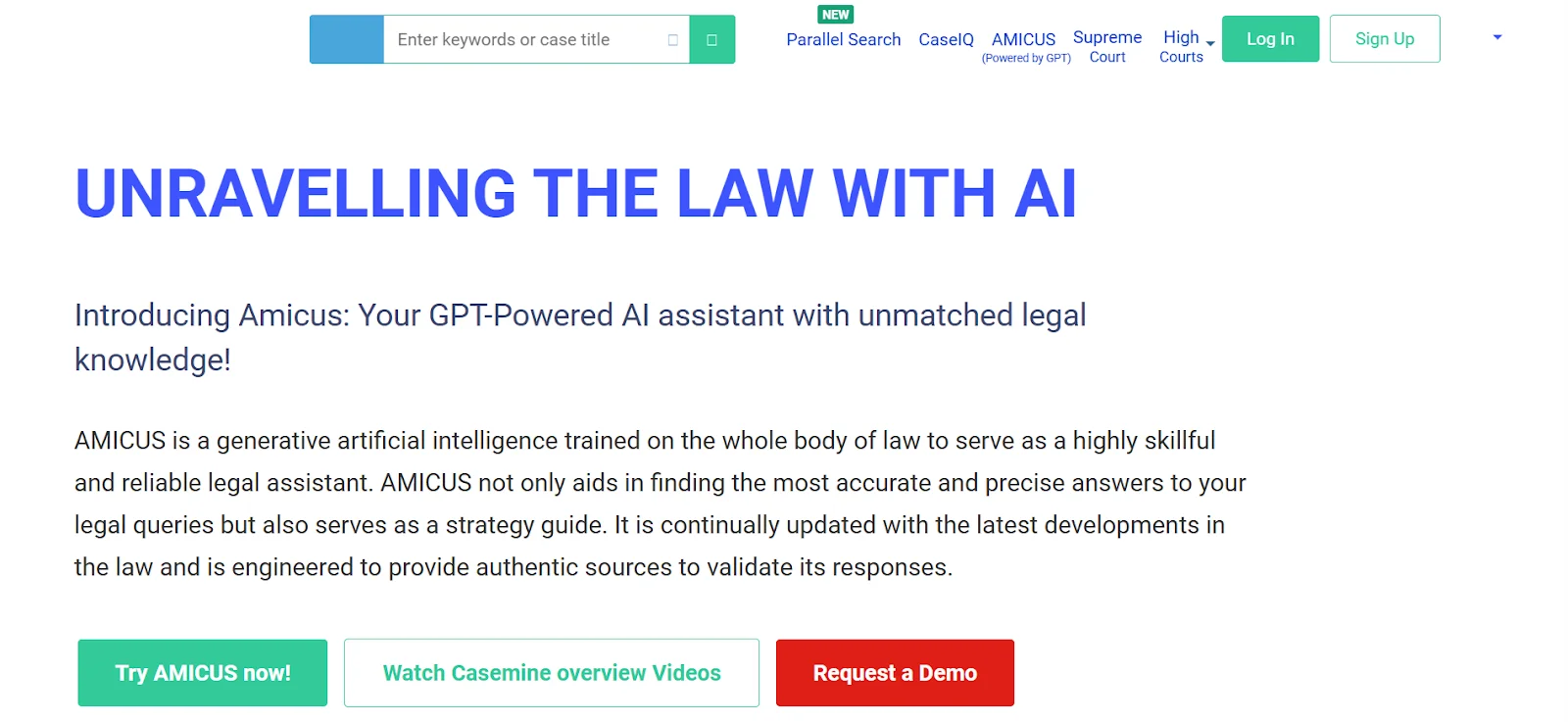
It offers the ability to follow the progress of a case and its citations, which lawyers may find helpful.
When is it used: For thorough legal studies, building strategies for, and grasping changes in case law.
DoNotPay
This AI platform doesn’t substitute for a paralegal, but it is known as the first robot lawyer available for the general public.

DoNotPay AI chatbot handles simple legal tasks such as challenging a parking ticket, canceling subscriptions, and Palo Alto Careers disputing fees. It’s used more for routine tasks, but it demonstrates how AI can provide legal assistance to more people, and some law firms also let clients use the white-labeled system for various jobs.
Lexion
Lexion’s AI and NLP technology helps lawyers at a company manage their contracts and follow internal compliance.

It can explore legal matters, remind members of a department about coming deadlines, and highlight major parts of a contract. Lexion’s chatbot is suitable for legal, sales, and finance, so managing legal processes can stay efficient as your company grows.
Kira Systems
Kira Systems can review a huge number of contracts in very little time. Though it doesn’t work as a conversational chatbot, people can query different documents and get the key clauses instantly.

If you do due diligence, M&A audit, or contract review in a law firm, Kira is there, making the work precise, prompt, and reliable even on a big scale.
Read Also: https://heyeve.ai/blogs/benefits-of-ai-in-legal-studies/
Conclusion
Today, to compete in the legal field, attorneys should use their brains, not just their muscles. And that’s the role an AI chatbot plays.
Regardless of your status as a solo employee or in a firm, these tools make your job easier by saving time, sharpening your thinking, and helping you work more accurately for your clients.
What’s even better? You can start with little money. Most chatbots powered by AI are budget-friendly, quick to set up, and anyone can figure out how to use them.
If you feel exhausted by regularly repeating certain activities and research isn’t keeping up, AI is here to give you a helping hand.
Frequently Asked Questions FAQs?
What is an AI training chatbot for lawyers?
An AI training chatbot is used by lawyers for automating legal research, drafting documents, intake clients, and checking compliance. You can see it as a lawyer always available on call.
Are AI chatbots accurate in legal work?
When the data is of high quality, the model will likely perform well. You should never rely on them exclusively, but they are great for accelerating your research, finding similarities among info, and improving document accuracy. Today, several law firms rely on AI chatbots in their daily routine.
Can small law firms afford legal AI tools?
Absolutely. Many AI chatbots have very cheap monthly memberships or give you the basics for free. Many lawyers and law firms rely on LawDroid, DoNotPay, and ChatGPT due to their affordability and effectiveness.

